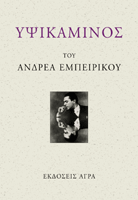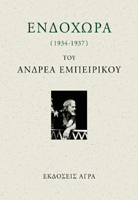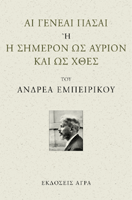|
In March 1935, eleven years after the publication of
the first manifesto of surrealism by Andre Breton, two hundred copies
of a collection of sixty-three prose poems entitled Blast-Furnace
were circulated in Athens. The collection was signed by one Andreas
Embiricos (1901-1975), the offspring of a well-known shipping family,
with no work published before then. Born in Braila, Romania, to a Greek
father and a Russian mother, Embiricos studied economics in Switzerland,
literature and philosophy in London and psychoanalysis in Paris. In
1929 he entered the circle of French surrealists, was initiated into
the technique of automatic writing and made the acquaintance of Breton
in person. Two months before Blast-Furnace appeared, he gave a lecture
on the subject of surrealism to "a grim middle-class audience who
listened in obvious annoyance", as an on-the-spot witness named
Odysseus Elytis (Nobel Prize 1979) noted.
Blast-Furnace holds a unique place in modern Greek poetry. No
poet prior to Blast-Furnace - in spite of indications that surrealism
was known in Greece before 1935 - and no poet since, has put together
a book so heretical, so cryptic and so 'difficult' - one which nevertheless
sold out in no time, 'not because it was of interest, but because it
was considered so scandalous, written by someone deranged', as the poet
himself reminisces. Without punctuation, in a language mainly scholarly
and precocious - something which the proponents of demotic Greek found
particularly
annoying - with interminable phrases, perfectly constructed but without
any apparent logical coherence, yet with the typically Greek fifteen-syllable
meter clearly
discernible, Blast-Furnace seems to have met the requirements
of free association and the resultant automatic writing. It would be
difficult however plausibly to maintain that these poems had an 'automatic'
or 'chance' origin or that no work was done on them, in spite of the
fact that Embiricos himself stated that his poems do not always develop
'within the limits of consciousness'. Every poem, he says, is a 'poem-event',
dynamic and self-contained, and its elements remain 'free of any compromised
or standardised aesthetic, moral or logical construction'. The recipe
was never to be repeated, in spite of the fact that the experiment succeeded
in bringing to the forefront the most authentic Greek surrealist writing.
Embiricos' next collection, Inner Land (1945), as well as a short
volume of prose, Writings or Personal Mythology (1960), contain
texts bathed in surrealist light, but with coherence and logical consistency.
It is now quite clear that what was mainly of interest to Embiricos
was to keep alive the subversive and emancipating strain of the European
surrealist movement and to promulgate the vision of a world free of
every type of oppression, a world 'without borders and without limits'.
Political, social and particularly sexual liberation were Embiricos'
main concern, so much so that he emerged as the Greek poet and visionary
par excellence of a world system of politics and co-existence. His city,
Oktana, described in the collection bearing the same name, "will
be the capital of the New World, in the heart of mankind's future",
a universal city, filled with poetry, love, pleasure, justice and freedom.
The eight-volume novel The Great Eastern (1990-1), is the most
extensive and the most daring modern Greek text, where all of Embiricos'
fantasies, doctrines and visions are
developed in an epic tone.
(Y. Yatromanolakis, from the volume Greece-Books and Writers,
National Book Centre of Greece, 2001).
|











